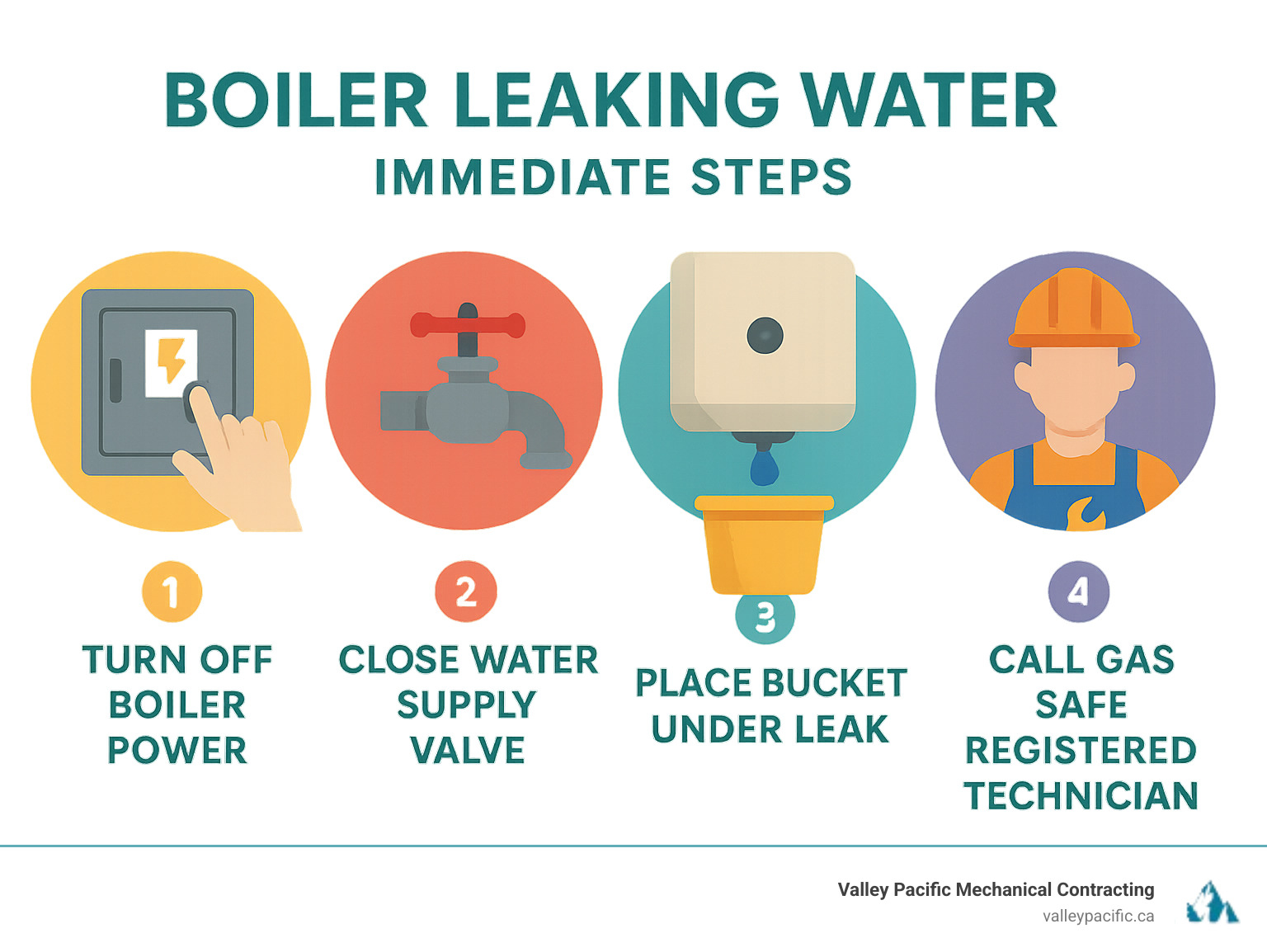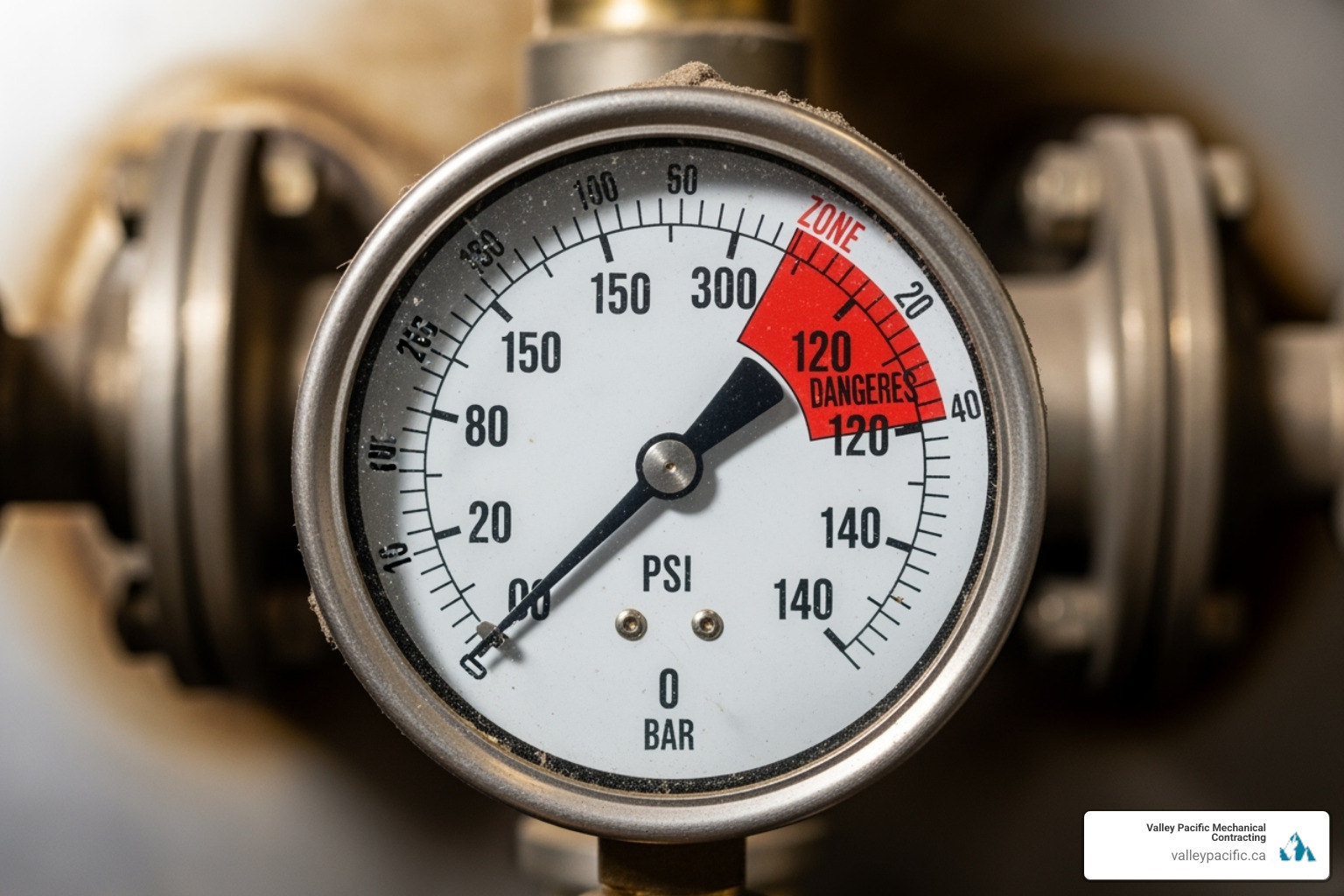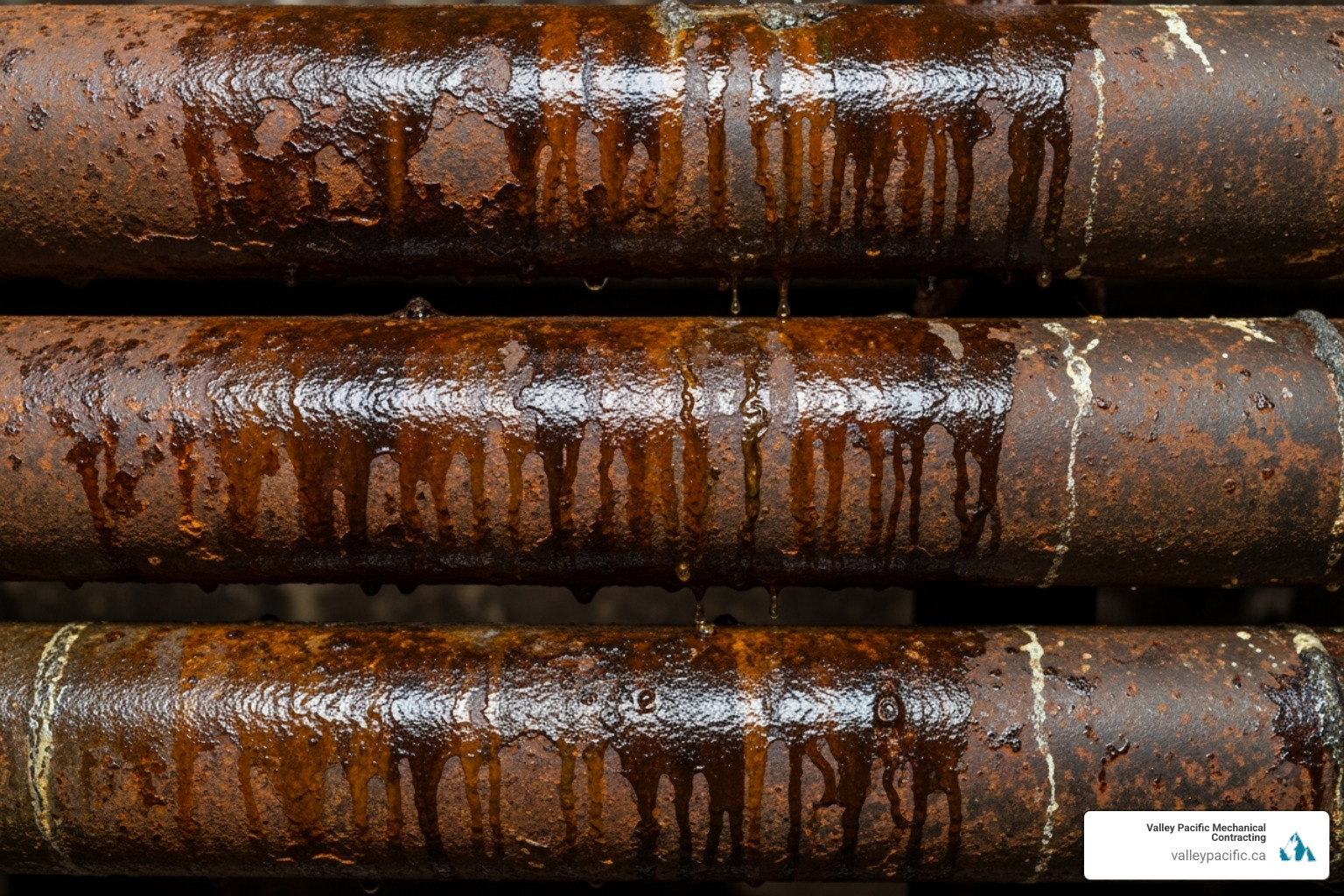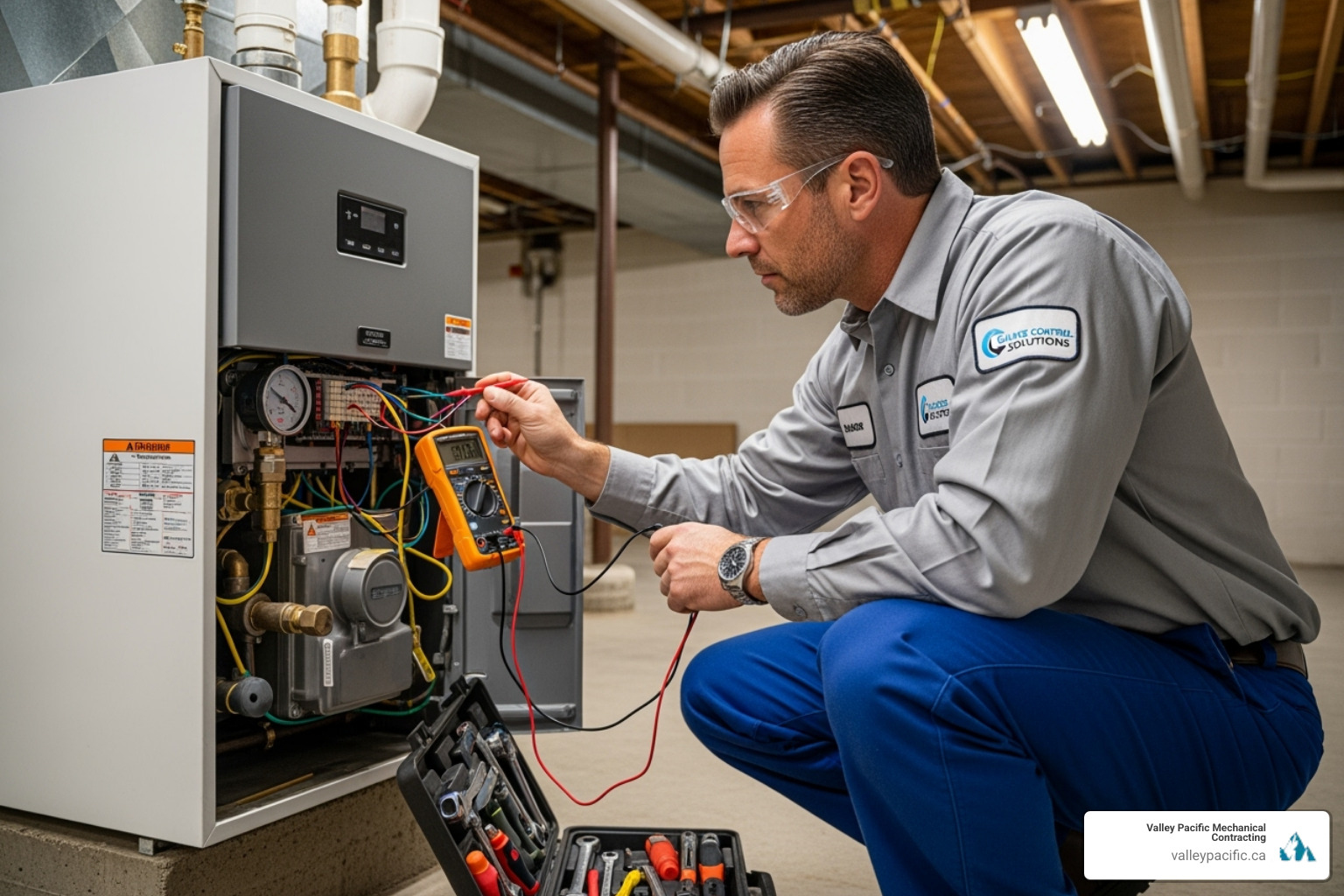The Drip Stops Here: A Guide to Fixing Boiler Leaks


Why Quick Action Matters When Your Boiler Starts Leaking
A boiler leaking water isn't just an inconvenience - it's a sign that your heating system needs immediate attention. Whether you're seeing a small drip or finding a puddle beneath your unit, taking swift action can save you from costly repairs and potential safety hazards.
Immediate Steps for a Leaking Boiler:
- Turn off the boiler - Switch off electrical power to prevent damage
- Shut off water supply - Close the isolation valve or main water supply
- Contain the leak - Place buckets or towels to catch dripping water
- Call a professional - Contact a Gas Safe registered technician for repairs
Common causes of boiler leaks include high pressure forcing water through the pressure relief valve, corroded components from age and wear, loose pipe joints that have worked free over time, and damaged seals around internal parts.
The good news? Not every leak means you need a complete boiler replacement. Many issues can be resolved with proper diagnosis and targeted repairs. However, some problems - like a cracked heat exchanger or extensive corrosion - may signal it's time for a new system.
Safety comes first. If you smell gas, see black soot stains, or notice your pilot light burning orange instead of blue, evacuate immediately and call emergency services. These signs indicate a dangerous gas leak, not just water.

First Steps: What to Do Immediately When Your Boiler Leaks
Finding a boiler leaking water can feel overwhelming, but taking the right steps quickly makes all the difference. Your safety comes first, and that means treating this situation seriously from the moment you spot that first drip.
Water and electricity don't mix well, and when they meet near your boiler, the results can be dangerous. Electrical shock is a real risk, not to mention the potential for significant damage to your heating system. That's why your first move should always be turning off the power to your boiler at your home's electrical panel.
Next, you need to shut off the water supply to prevent the situation from getting worse. Look for the isolation valve on your boiler's incoming water line and turn it to the closed position. Can't find it? Don't worry - turning off your home's main water supply works just as well and keeps you on the safe side.
Now it's time to contain the leak as best you can. Grab whatever you have handy - buckets, towels, even old t-shirts - and start catching that dripping water. Your floors and walls will thank you later, and it gives you time to figure out your next steps without watching the puddle grow.
Is it Water or Gas? Recognizing a More Serious Danger
Here's where things get more serious. While a boiler leaking water needs attention, a gas leak is a whole different emergency. The good news is that modern boilers are designed with sealed combustion chambers that keep dangerous gases safely outside your home. But when something goes wrong, you need to know the warning signs.
Gas leaks announce themselves in several ways. That distinctive sulphur or rotten egg smell is the most obvious clue - natural gas companies add this odor specifically so you'll notice it. You might also hear hissing sounds coming from your boiler or gas lines, which means gas is escaping somewhere it shouldn't be.
Keep an eye out for black soot stains around your boiler too. These dark marks or scorch marks suggest incomplete combustion, which can be tied to gas supply problems. If your boiler has a pilot light, watch how it burns. A healthy flame burns blue, but orange or yellow flames signal trouble.
Your body can also give you warning signs. Dizziness, nausea, headaches, or unexplained fatigue when you're near the boiler could mean carbon monoxide is building up - and that's an invisible, odorless danger you can't afford to ignore.
If you suspect a gas leak, don't hesitate. Get everyone out of the house immediately, including your pets. Resist the urge to flip light switches or use your phone inside - any spark could be dangerous. If you can safely open windows and doors on your way out, do it to help ventilate the area.
Once you're at a safe distance from your home, call 911 or your local gas emergency service. Don't go back inside until emergency personnel give you the all-clear. It's better to spend a few hours somewhere else than to risk your family's safety.
For those with oil-heated boilers, watch for oil stains, pooling, or stronger-than-normal oil smells. Close the valve on your oil tank, open windows to prevent fume buildup, and call a heating professional right away.
Diagnosing the Cause of a Boiler Leaking Water
Now that you've made everything safe and contained the immediate mess, it's detective time! Finding out exactly where your boiler leaking water is coming from will help you understand what you're dealing with. Think of it like following breadcrumbs - each clue will lead you closer to the source of the problem.
Start by grabbing a flashlight and taking a careful look around your boiler. Check all the visible connections where pipes meet the unit. Look for any obvious drips or wet spots. Sometimes the leak might be coming from one place but dripping down to pool somewhere else entirely, so trace any water trails back to their starting point.

High Pressure and the Pressure Relief Valve (PRV)
Your boiler's pressure gauge is like a health monitor for your heating system. Take a look at that round dial on the front of your unit - it should show a reading between 1 and 1.5 bar, usually marked as the green zone. If that needle is pointing into the red zone, you've found your first major clue.
When pressure gets too high, your boiler's built-in safety hero steps in: the Pressure Relief Valve (PRV). This clever little device is designed to release excess water before things get dangerous. If you spot water dripping from a small pipe that leads outside from your boiler, or see moisture around the PRV itself, high pressure is likely your culprit.
What causes this pressure buildup? Sometimes it's as simple as someone accidentally overfilling the system. Other times, it could be a faulty expansion vessel that's not doing its job of absorbing pressure changes, or even a blockage somewhere in your heating system.
Here's the thing - a tiny drip from the pressure outlet pipe is sometimes normal. It's just your boiler doing its safety dance. But if you're seeing a steady stream or a growing puddle, that's when you know something needs attention. We've written about what to do when boiler pressure drops, and understanding high pressure issues is just as important for keeping your system healthy.
Corrosion and Component Failure
Let's face it - boilers aren't immortal. After about 20 years of faithful service, even the best units start showing their age. Internal corrosion is like rust's sneaky cousin, slowly eating away at seals, pipes, and other vital parts from the inside out.

If you notice rust spots around your boiler or see discolored water when bleeding your radiators, corrosion might be behind your leak. The constant presence of water and the chemical reactions happening inside your heating system create the perfect storm for metal components to break down over time.
The heat exchanger is often the first casualty in this battle against time. This hardworking component heats all the cold water flowing through your system, but it's also vulnerable to cracks as it ages. When a heat exchanger starts failing, you'll typically see your boiler pressure dropping mysteriously, the unit cutting out more frequently, and yes - water appearing where it shouldn't be.
Pump seals are another common failure point. Your boiler's pump works tirelessly to circulate heated water throughout your home, but those rubber seals can harden and crack over time. When they fail, water finds its way out through the smallest gaps.
Major component failures like these can be expensive to repair. In fact, commercial systems facing significant damage can end up paying up to $5,000 for replacement equipment, which is why catching problems early matters so much.
Loose Joints and Worn-Out Seals
Sometimes the answer to your boiler leaking water mystery is refreshingly straightforward. Your heating system connects to your boiler through various pipe joints, and these connection points can work loose over time. Think about it - your pipes are constantly expanding when hot water flows through them and contracting as they cool down. This daily dance of expansion and contraction can gradually loosen even the most secure fittings.
If the original installation was badly sealed or if the installer took shortcuts, you might start seeing problems sooner rather than later. Vibration from the boiler's operation can also contribute to joints working loose over the years.
Degraded rubber seals are another common culprit. These small but mighty components create watertight barriers around joints and within internal parts. Unfortunately, rubber doesn't age gracefully - it becomes brittle, cracks, or simply loses its flexibility. When seals fail, even tiny gaps can let water escape.
Don't forget to check your filling loop - that's the connection that lets you add water to your system when pressure drops. If someone accidentally left it open after topping up the system, or if it's developed a fault, it can continuously feed water into your boiler. This creates a cycle where excess pressure builds up, the PRV releases water, and the filling loop keeps adding more.
How to Fix a Boiler Leaking Water: DIY vs. Professional Repair
Now that we've explored the common causes, the big question is: can you fix it yourself, or is it time to call in the cavalry? When a boiler leaking water shows up uninvited in your home, the temptation to grab your toolbox and dive in is understandable. After all, who doesn't love a good DIY victory?
But here's the thing - boilers are complex beasts that deserve respect. They're dealing with hot water, gas, electricity, and pressure all at once. It's like trying to juggle flaming torches while riding a unicycle. Some people can do it, but most of us are better off watching from a safe distance.

The golden rule? Unless you're a qualified and Gas Safe registered engineer, attempting internal boiler repairs isn't just risky - it's potentially dangerous and could void your warranty. Think of your boiler like a sleeping dragon. Sometimes you can tidy up around it, but you really don't want to poke it in the wrong place.
Simple DIY Fixes You Can Try
Before you throw in the towel completely, there are a few gentle approaches you can try. These are the equivalent of offering your boiler a cup of tea rather than performing surgery on it. Always make sure the power and water are off first - safety isn't negotiable.
Tightening a loose joint might be your simplest win. If you can see water dripping from a visible pipe connection, try giving it a gentle quarter-turn with a spanner. Think of it like tightening a loose lid on a jar - firm but not forceful. Dry the area thoroughly and watch to see if your leak decides to call it quits.
Bleeding radiators to lower pressure can work wonders when your pressure gauge is showing red-zone numbers. This releases trapped air and some water, potentially bringing your system back into that sweet spot of 1-1.5 bar. It's like letting a little steam out of a pressure cooker before it starts whistling.
Checking the filling loop is another simple detective move. Make sure it's firmly closed - if it's stuck open, it's like leaving a tap running into your system, causing continuous pressure buildup.
Using a bucket to catch drips isn't technically a fix, but it's an essential damage-control measure. Sometimes the best immediate solution is simply containing the problem while you figure out your next move.
The basic tools you'll need for these simple checks include a spanner, dry cloth, and bucket - nothing too fancy or intimidating.
When to Call a Professional for Boiler Repair
Here's where we need to have an honest conversation. Some boiler problems are like trying to perform brain surgery with a butter knife - technically possible, but really not advisable. Professional help becomes essential when you're dealing with internal leaks hiding inside the boiler casing, where amateur hands have no business wandering.
A faulty heat exchanger is definitely professional territory. This is complex, expensive work that requires expertise and proper tools. Similarly, damaged pump seals and other internal components need someone who knows exactly what they're doing and has the right replacement parts on hand.
Persistent high pressure that doesn't respond to radiator bleeding suggests deeper issues that need professional diagnosis. And here's the big one - any gas-related smells or issues mean you should evacuate and call emergency services immediately, then follow up with professional repair.
If the leak persists after your gentle DIY attempts, or if you're simply not confident about what you're seeing, that's your cue to step back. There's no shame in recognizing when a problem is bigger than your comfort zone.
We provide comprehensive boiler repair services throughout the Lower Mainland, including Boiler Repair Langley BC and Boiler Repair Maple Ridge BC. Our experienced technicians have seen every type of boiler leaking water scenario imaginable, and we're equipped to diagnose and fix issues safely while ensuring your system runs efficiently for years to come.
Prevention and Long-Term Solutions
Here's the truth about dealing with a boiler leaking water: the best fix is preventing it from happening in the first place. Think of it like taking your car for regular oil changes - a little maintenance goes a long way toward avoiding those dreaded roadside breakdowns.
Annual boiler servicing isn't just something your heating technician suggests to drum up business. It's genuinely your best defense against unexpected leaks and costly repairs. During a professional service, our qualified technicians inspect every component, check for those sneaky early signs of wear or corrosion, test system pressure, and make sure everything's humming along nicely. This proactive approach catches minor issues before they turn into major headaches - and major expense.
Beyond your yearly checkup, consider system flushing. Over time, your heating system accumulates sludge and debris (think of it as the heating equivalent of cholesterol in your arteries). This buildup contributes to corrosion and blockages, which can eventually lead to leaks. A powerflush or chemical flush gives your system a thorough internal cleaning, improving efficiency and reducing the risk of internal corrosion.
Installing a magnetic filter is another smart investment. These clever devices collect metallic debris before it can cause damage to your boiler - like having a bouncer at the door of your heating system.
The average boiler lifespan is roughly 20 years. With proper preventative maintenance, your boiler can reach its full potential and avoid premature failure. It's much more cost-effective to invest in regular care than to deal with emergency repairs on a cold winter night.
Is It Time to Replace Your Boiler?
Sometimes, when a boiler leaking water becomes a recurring nightmare, it's time for an honest conversation about replacement. If you're constantly dealing with leaks, or if the repair estimate makes your wallet weep, a new boiler might actually be the smarter financial choice.
Age matters. If your boiler is approaching or exceeding 15 years old, even a seemingly minor leak could signal widespread internal wear. It's like when your old car starts needing repairs every few months - at some point, you're just throwing good money after bad.
The frequency of repairs tells a story too. If you're on a first-name basis with your heating technician because they're at your house every few months, those costs add up quickly. Meanwhile, you're dealing with the stress and inconvenience of an unreliable heating system.
Here's where modern boilers really shine: energy efficiency. Newer units boast significantly higher AFUE ratings, meaning they convert more fuel into actual heat for your home. This translates to lower monthly energy bills - sometimes dramatically lower. While the upfront cost of a new boiler is higher, the long-term savings in energy consumption and avoided repair costs often make replacement the smarter financial choice.
Warranty protection is another compelling reason to consider replacement. New boilers come with comprehensive manufacturer warranties, plus installation warranties from reputable contractors. Compare that to repairing an aging system where you're essentially gambling on how long the fix will last.
We understand that replacing a boiler feels like a big decision. That's why we've developed our Professional Boiler Replacement Process to make it as straightforward and stress-free as possible. Whether you need Boiler Installation Mission BC or anywhere else in the Lower Mainland, we ensure a seamless transition to a more efficient and reliable heating system that will keep you comfortable for years to come.
Frequently Asked Questions about a Boiler Leaking Water
When you find a boiler leaking water, it's natural to have questions. We've helped countless homeowners in the Lower Mainland deal with these situations, and these are the questions we hear most often.
Can I still use my boiler if it's leaking?
Absolutely not - and we can't stress this enough. A boiler leaking water poses serious risks that go far beyond just a puddle on your floor. Water and electricity make a dangerous combination, and even a small leak can short-circuit electrical components in your boiler.
When electrical components get wet, you're looking at potential damage that could turn a simple repair into a complete system replacement. The water can also cause corrosion and rust to spread throughout your heating system, creating problems that extend far beyond the original leak.
Even if the leak seems minor, it can lead to mold growth and structural damage to your home over time. The safest approach is always to turn off the boiler immediately, shut off the water supply, and call a professional. Your safety and your home are worth more than a few hours without heat.
How much does it cost to fix a leaking boiler?
This is probably the question we get asked most, and honestly, it's like asking "how long is a piece of string?" The cost depends entirely on what's causing your boiler leaking water problem.
If you're lucky and it's just a loose joint that needs tightening, the repair might be relatively inexpensive. However, if we're dealing with a faulty heat exchanger or extensive internal corrosion, you're looking at a much more significant investment.
Simple fixes like replacing a worn seal or adjusting system pressure are on the lower end of the cost spectrum. Major component failures, such as a cracked heat exchanger or failed pump seals, require more extensive work and parts replacement.
The age of your boiler also plays a role. Older systems often need additional work to bring everything up to current standards, which can add to the overall cost. We always provide a thorough assessment and detailed quote before starting any work, so you'll know exactly what to expect.
Is a leaking boiler an emergency?
The answer depends on the severity and location of the leak, but our advice is always "better safe than sorry."
It's definitely an emergency if the leak is significant and water is pooling near electrical outlets or components. This creates an immediate risk of electrical shock or fire. Similarly, if you suspect any gas involvement - strange smells, hissing sounds, or discolored flames - evacuate immediately and call emergency services.
It's also urgent if you notice water spreading to areas where it could cause structural damage or if the leak is getting worse by the hour. Don't wait until morning if your basement is starting to flood.
For smaller, contained drips, while it's not a middle-of-the-night emergency, it still needs prompt attention. What starts as a few drops can quickly escalate into a major problem. The longer you wait, the more damage can occur, and the more expensive the eventual repair becomes.
We offer 24/7 emergency service throughout the Lower Mainland because we understand that heating problems don't always happen during business hours. When in doubt, give us a call - we'd rather help you assess the situation and give you peace of mind than have you worry all night about whether your home is safe.
Stop the Drip and Restore Your Peace of Mind
When you find a boiler leaking water, it's natural to feel that sinking feeling in your stomach. But here's the good news: you're now armed with the knowledge to handle it like a pro. We've walked through the most common culprits - from high pressure forcing water through the pressure relief valve to corroded components showing their age, loose joints that need a gentle tightening, and worn-out seals that have simply done their time.
The most important thing to remember? Safety first, always. Those immediate steps we covered - turning off the power, shutting off the water supply, and containing the leak - aren't just suggestions. They're your first line of defense against turning a manageable problem into a costly disaster.
While it's tempting to grab your toolbox and dive in, most boiler leaking water situations need the trained eye of a qualified professional. You might be able to tighten a loose joint or bleed a radiator to lower pressure, but internal leaks and component failures require specialized expertise. There's no shame in calling for backup - it's the smart move.
Think of annual servicing as insurance for your heating system. Regular maintenance, system flushing, and installing magnetic filters aren't just nice-to-haves - they're your best bet for preventing future leaks and extending your boiler's life. And when your trusty boiler starts showing its age with frequent breakdowns and rising repair bills, replacement might actually save you money in the long run.
At Valley Pacific Mechanical Contracting, we've been solving heating headaches for over 30 years across the Lower Mainland. Whether you're dealing with an emergency leak at 2 AM or planning a Boiler Installation Langley BC, our team is here to make the experience as smooth as possible. We serve Mission, Maple Ridge, Pitt Meadows, Coquitlam, and Langley with our signature headache-free approach and 24/7 emergency service.
Every drip tells a story. The sooner you listen to what your boiler is trying to tell you, the sooner you can get back to enjoying a warm, comfortable home without worrying about puddles on the floor.








